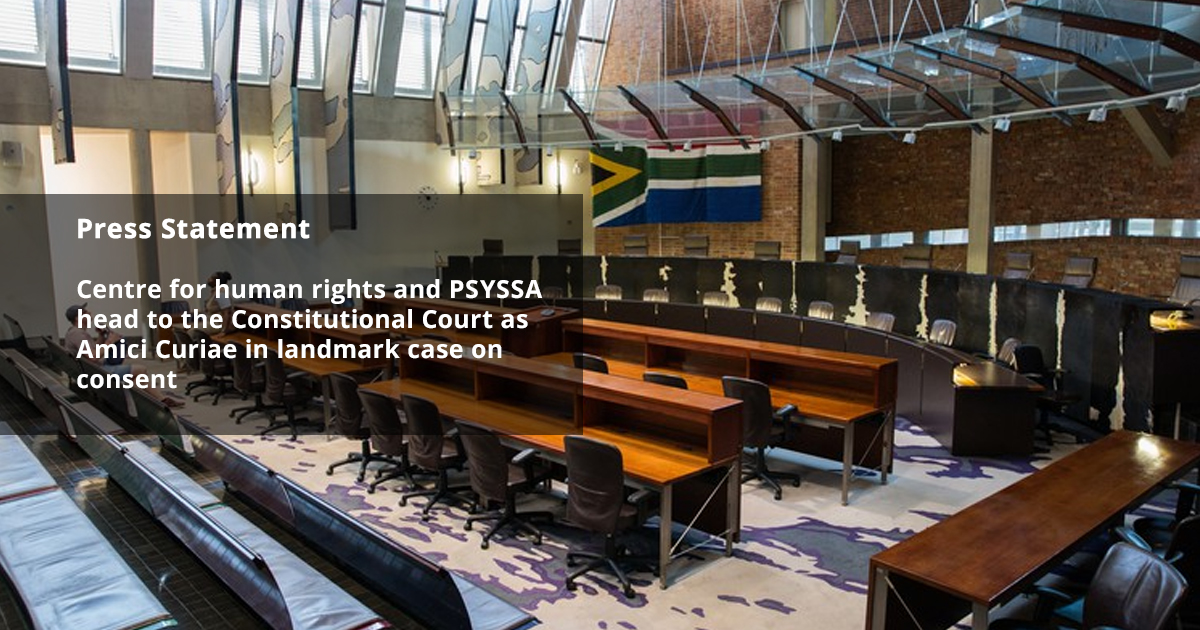On 25 September 2025, the Centre for Human Rights, University of Pretoria (CHR), and the Psychological Society of South Africa (PsySSA) (the amici curiae), represented by Lawyers for Human Rights, will appear before the Constitutional Court of South Africa, to make oral submissions as part of their intervention as amici curiae in the matter of The Embrace Project NPC and Others v Minister of Justice and Correctional Services and Others (CCT314/24) and Centre for Applied Legal Studies and Others v The Embrace Project NPC and Others (315/24).
Background on the case
The proceedings before the Constitutional Court arise following the ground-breaking ruling of the Pretoria High Court (High Court) on 30 September 2024. The High Court declared sections 3,4,5,6,7,8,9, and 11A, read with section 1(2) of the Criminal Law (Sexual Offences and Related Matters Act, 32 of 2007) unconstitutional, based on its finding that the provisions do not criminalise sexual violence where a perpetrator wrongly and unreasonably believed that the complainant was consenting to the conduct in question. Alternatively, the High Court found that the provisions were unconstitutional to the extent that they permit a defence against a charge of sexual violence where there is no reasonable belief in consent.
The Applicants subsequently applied to the Constitutional Court for an order confirming the High Court’s order of constitutional invalidity.
CHR and PsySSA applied to be admitted as amici curiae in February 2025, and were subsequently granted permission by the Constitutional Court to intervene. The amici curiae will make oral submissions supported by their written submissions.
The amici curiae’s submissions
At the outset, it is important to note that the subject matter of this case, being consent in sexual offence cases, is highly complex. Accordingly, the amici curiae consider their submissions as integral to the Court’s understanding of consent, and a necessary aid to the Court’s determination of the constitutionality of the impugned provisions. In particular, the submissions provide the Court with an understanding of the following:
- The hardwired nature of responses to the panic and fear embedded in rape or sexual assault (which can include paralysis, numbness, detachment and extreme immobilisation), which may render survivors unable to express their non-consent.
- The existence of intersecting identity factors in a survivor of rape or sexual assault (such as age, social status, cultural background, and sexual orientation) which can create a power imbalance between the parties and, therefore, affect the capacity of the survivor to assert and communicate non-consent.
Other organisations involved in the matter are the Centre for Applied Legal Studies (CALS), and the Women’s Legal Centre Trust (WLCT). CALS is appealing the ruling of the High Court, and has made submissions that seek the removal of consent as a definitional element of the crime of rape. The WLCT supports neither the relief sought by the Applicants nor CALS as it submits, among other things, that the relief sought by the Applicants—in particular the introduction of a ‘reasonable steps’ requirement in sexual offences—is unnecessary and inappropriate.
Going forward
CHR and PsySSA’s submissions are significant as they seek to propose a holistic, intersectional, and survivor-centric approach to the future prosecutions of sexual offences, by highlighting the complex nature of consent. The submissions bring to the fore psycho-legal perspectives that ensure the acknowledgement of the lived realities of trauma. Thus, the submissions are invaluable in shaping the Court’s understanding of how consent should be understood and interpreted in future cases.
The amici curiae will be represented by Adv. R. Kruger and Adv. T. Thumbiran.
For more information, please contact:
Ruth Versfeld
Centre for Human Rights
ruth.versfeld@up.ac.za
Kayan Leung
Lawyers for Human Rights
kayan@lhr.org.za


